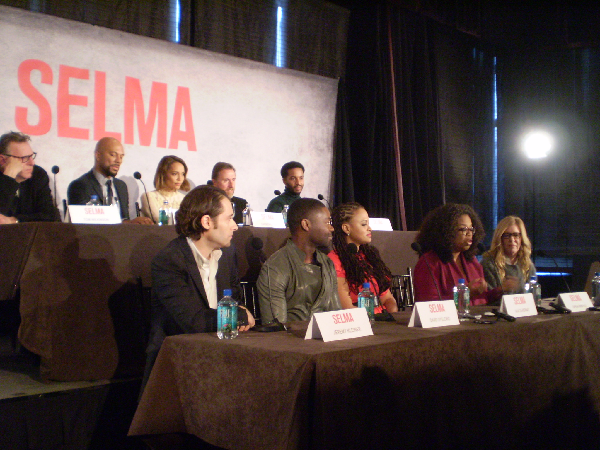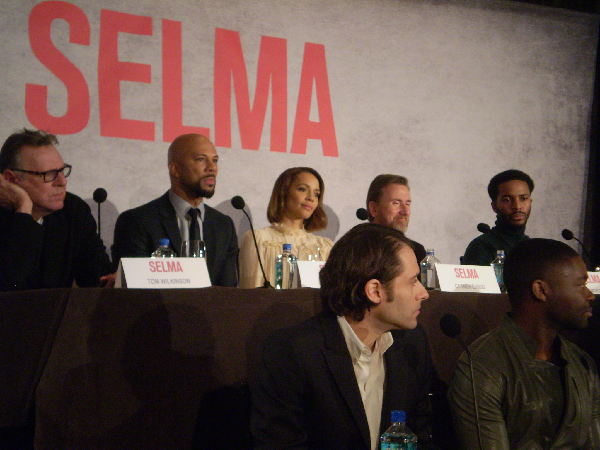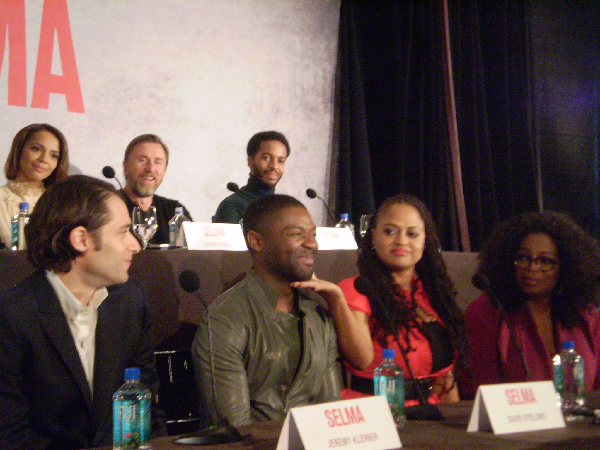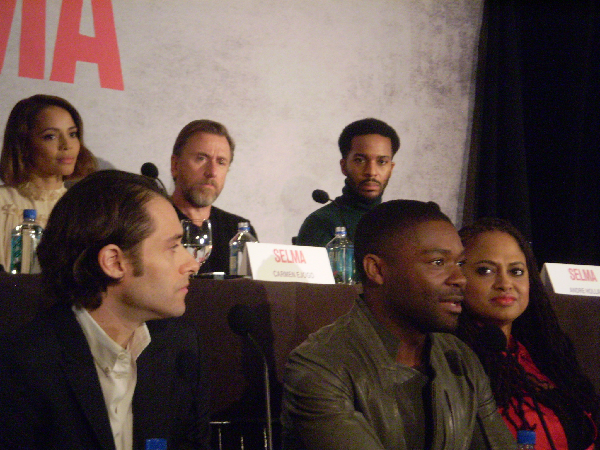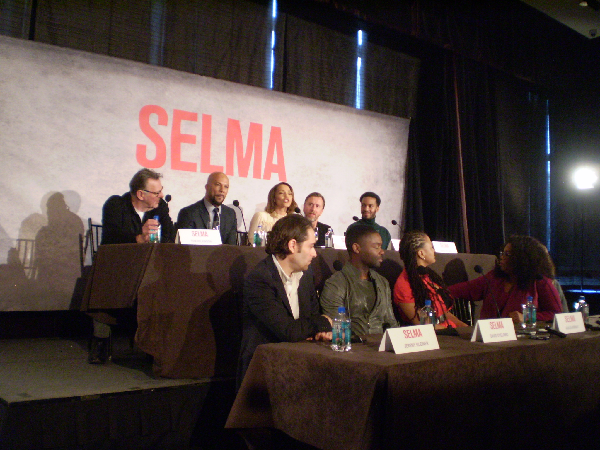Diligently working to realize a hard-won moment of long-awaited justice and recognition is a gratifying message that not only defines the determined nature of the lauded protagonists in the new historical drama, ‘Selma,’ but also the film’s devoted cast and filmmakers. Ava DuVernay, who recently made history for becoming the first black female director to be nominated for a Golden Globe Award, is deservingly receiving praise for her years of research and dedication in filming a dramatized version of the 1965 Alabama voting rights marches led by Martin Luther King, Jr., which is featured in the biographical movie. Fellow Golden Globe nominee David Oyelowo gave a compelling portrayal of the civil rights leader’s emotional struggle with maintaining his poise to lead his followers who were also dedicated to achieving racial equality. The cast and crew’s tireless commitment to the activist’s noble determination allowed the drama to grippingly explore how continued hard work is truly the right path to take when aspiring to reach your goals.
‘Selma’ begins with Martin contemplating his life choices and decisions with his wife, Coretta Scott King (Carmen Ejogo), as he prepares to accept the Nobel Peace Prize for combating racial inequality through nonviolence in 1964. After reinforcing his belief that equality is obtainable through peaceful negotiations, the drama showcases one of the most important issues the activist strove to achieve-equal voting rights for blacks and whites, especially in the South. When a working-class black woman, Annie Lee Cooper (Oprah Winfrey), then attempts to register to vote in an Alabama courthouse, the white clerk repeatedly disclaims her qualification to cast a ballot.
With such wrongful denials of the right to vote to blacks across the South, President Lyndon Johnson (Tom Wilkinson) has managed to convince Congress to pass the Civil Rights Act, which makes it illegal to segregate public facilities by race. Martin accepts the process the country’s leader has made during a visit he makes to the White House. Yet Martin also respectfully but candidly reminds the president of their past broken deals, as well as the legal right to vote isn’t valid if a legal infrastructure that enforces the freedom isn’t enforced. While President Johnson says he wants to help, he also states that his administration has changed its legislative focus to other imperative issues, including launching a war on the country’s poverty.
With the president not fully supporting Martin’s imitative to enforce equal voting rights, the humanitarian stages three protest marches that start in Selma and lead to Alabama’s state capitol building in Montgomery. Martin believes launching acts of nonviolent resistance in front of as many reporters and TV cameras as possible will help garner as much national support as possible. While his approach to protesting and captivating attention is occasionally challenged by his fellow activists, including two Student Nonviolent Coordinating Committee members, James Forman (Trai Byers) and John Lewis (Stephan James), Martin believes peaceful protesting is the only way to fight back against Alabama Gov. George Wallace (Tim Roth) and his racist administration.
While Martin initially believes that by showcasing the governor’s state-sanctioned police brutality on national news, he can force Johnson to take action to the federal level, but he begins to question his decision after witnessing the true cruelty unleashed on his fellow protestors. After President Johnson elicits the help of FBI Director J. Edgar Hoover (Dylan Baker) to stop the preacher’s mission to utilize the protests to garner equality, the humanitarian calls upon the help of fellow activist James Bevel (Common) and civil rights attorney Fred Gray (Cuba Gooding, Jr.) to further emphasize the importance of equal freedom for all Americans.
DuVernay, Oyelowo, Winfrey, Ejogo, Wilkinson, Roth and Common generously took the time recently to talk about filming ‘Selma’ in a press conference at New York City’s Mandarin Oriental Hotel. Among other things, the cast and filmmaker discussed how there has never been a studio film made with Dr. King at the center of the story, so when the director signed onto the film, her main goal was to show the activist in all of his human complexities; how Oyelowo, like Dr. King, is a father of four, a Christian and a supporter of justice, and how speaking with Ambassador Andrew Young, who’s played by André Holland in the drama, helped him understand the protagonist’s mindset; and how people don’t truly know themselves and where they’re going, unless they know where they’ve come from, as history shows that everyone involved in the movement was equally important, as they demonstrated the courage to stand up for themselves.
Question (Q): Ava, from a director’s position, how did you strike the balance between a responsibility to history and a true story, and the creative kind of narrative that you wanted to tell in this film?
Ava Duvernay (AD): I don’t think anyone here wanted to make a film about a statue, speech, street name, initials or a catch phrase, or all the things that I feel King has been reduced to in a lot of ways. He was a dynamic, charismatic, brilliant mind. He was a man of faith who was sometimes unfaithful, and he was also guilty and depressed. He also had an ego, liked to laugh and was a prankster, so overall, he was a human being.
There hasn’t been a film made with Dr. King at the center released by a studio, ever. So when we were charged to do it, our main goal was to show him in all of his human complexity, unlock him from the statue and tell the story through that lens.
Q: David, speaking of unlocking Dr. King from the statue, what was your transformation process like to play him for the film?
David Oyelowo (DO): Well, Dr. King did not think of himself as an icon. He didn’t walk around thinking of himself as a historical figure. He was a man. I am so full of admiration, in terms of what he did, and I am not him. But the thing that I could seize upon was he was a father of four, as I am, and he was a Christian, as I am. He was also someone who valued justice, as I do, so those were my entry points.
One of the most valuable sources I had for finding him was Andrew Young. I spent a lot of time with Ambassador Young, and he talked to me about his friend. He talked to me, as Ava just mentioned, about the prankster, the father and the man who was at times unsure, and that was the foundation on which I had to build.
One of the amazing things for me was the journey I went through in order to get to this place. I had the privilege of being in films like ‘Lincoln,’ in which I played a Unionist soldier. I played a preacher in ‘The Help’ and a black fighter pilot in ‘Red Tails.’ I also played the son of a butler in ‘The Butler,’ who was in the sit-ins and the freedom rides, and became a Black Panther. All these things also went into this portrayal. So I feel like in the seven years since I read this script, I was on this journey towards this.
Q: Oprah, you not only served as a producer on the film, but also played Annie Lee Cooper. Why did you choose to play a role in front of the camera, as well as behind the scenes?
Oprah Winfrey (OW): I did it because Ava made me do it. Ava sent me an online piece from a Selma newspaper regarding the real Annie Lee Cooper when she celebrated her 100th birthday in 2010. The piece talked about her life and memories of that time in Selma, where she actually knocked out a sheriff-she had the fight with Sheriff Clark. At the end of the piece, it said every day she watched the Oprah show at 4pm with a tuna fish sandwich. Ava said, “Don’t you think it would mean a lot to her to know that you, who she watched every day at 4 o’clock with a tuna fish sandwich, was portraying her?” So that was it.
I first said, no, as in every film I’ve been in, I end up hitting somebody. In my last movie (‘The Butler’), I had to slap David. I said, “I don’t want to do another film where I’m knocking somebody out or I’m having a fight.” But that fight with the sheriff really happened, and there’s a famous photograph of her being pinned down by the two deputy sheriffs. So I said yes for Annie Lee Cooper, and the fact that she ate the tuna fish sandwich while watching the Oprah show every day.
But more importantly, I did the film for every other woman and man in my history who took that walk to the registrar’s office and was turned down, and then went back home and tried it another year. This was Annie Lee Cooper’s fifth time trying to register to vote. When you think about what it takes to keep getting up and saying, I will, and I can, in the face of an entire society that says that you cannot and you will not, I just wanted to be able to take the few minutes in that walk and pay tribute to all of those people. That’s why I said yes.
Q: Carmen, you gave such a beautiful performance as Coretta Scott King in ‘Selma,’ but this wasn’t the first time you played her. (The actress first played the activist’s wife in the 2001 television film, ‘Boycott.’) What brought you back to the role, and what did you learn from your first portrayal that you brought into your second performance?
Carmen Ejogo (CE): Well, I was excited to explore the character for a second time, and I can’t think of any other actor that’s got the chance to explore the same character at a different part of their life. What excited me about doing it again was that it was a very different take, and she’s a very different woman at this point.
There’s a burden and a weariness now. The marriage is in a very different space. I think Ava’s intention to not explore the iconography and mythology of these people, and get behind the curtain to deconstruct the mythology, was what was most intriguing to me. I’m really excited by characters that have an external life that doesn’t match up to the internal, and I feel like Coretta was very much that person. I remember watching an episode of Oprah while I was in the UK of a makeover of Coretta.
OW: Good lord!
CE: It stuck with me, even I didn’t really know who Coretta was at that point. I was just a girl in the UK watching your show. I very vividly remember being so struck by a woman who still had a hairstyle and a makeup that was stuck in time, to some degree, but she was really determined to hold on to a moment in time that she felt in some ways beholden to. Oprah, you did a great job, and made her look so different. There was a whole other life that came out in her in that moment, and then the next day she went back to being what we expected of her.
OW: I even sent the hairdresser to Atlanta to try to keep her hair looking like that, but she couldn’t accept it.
CE: She couldn’t do it. Part of that was really interesting to me, that as a woman who had so much vitality, and was an academic, an intellectual, an artist and a singer, somehow felt that those things had to be somewhat suppressed for the betterment of the movement and for the sake of the marriage and being the mother to her children. That was so heroic to me in so many ways.
I think the scene that Ava wrote in the center of the film, where you get to see her finally being powerful, vulnerable and frustrated, for the first time, was brilliant. I think you get to see a far more multilayered woman than I got to play in in ‘Boycott.’ So that’s why I wanted to do it.
Q: Ava, how challenging is that for you to have added so many layers to a story which could have been told with so much built-in drama for the voting rights act?
AD: A risk for me as a filmmaker was to make a film that feels like medicine and spinach. We’re on the other side of it now, so it feels good. But when facing the idea of making a film about Dr. King, you ask, what do you do to make that feel urgent, vital and immediate, and not like a dusty history book? The ways you do it is to focus on the story and character, and in order to do that, you have to be telling the truth about people. I don’t think a standard script approaching this material would have attracted the caliber of the cast or our collaborators who worked on this.
Q: Tom, President Lyndon B. Johnson has been often portrayed in films, so you had a lot to draw from, in terms of prior performances. But there was a side to your character that was also more personal in this film. What was the process like of showing that side of the president?
Tom Wilkinson (TW): I hadn’t watched any other portrayals of President Johnson, but I didn’t really remember them. I didn’t really do a lot of research into him, but just enough to get an overall sense of him. I wasn’t going to do an impersonation, but wanted to make sure I was doing the right thing.
Q: For the actors, what were some of the ways that you coped with the dark characters that you were dealing with?
Tim Roth (TR): Well, my dad was a leftie, and an American man who went to England and fought for the British in the Second World War. When we were kids, my mum was also a leftie, so we were taken to demonstrations. We were brought up to be socially active.
Dr. King and Wallace, who was a monstrous human being, were both presences in our house. He was a very flat two-dimensional kind of animal who was someone to loath, for good reason.
But then when Ava came to me to have a go at this, what am I supposed to do? You’ve got to try to bring a three-dimensional character to the screen. So I had to try and find some kind of humanity that I could latch onto. The one thing I did, which is similar to what David was talking about, was too look at footage of him, and there’s the obvious stuff that we all know. But there was a piece where his son was talking about him in a very different way. I grabbed onto that, so I could find a little bit of humanity to thread in the limited amount of space that we had to deal with this guy.
Q: This film looks at just how important knowing your history is. How important is knowing your history to all of you?
OW: I think you don’t know yourself, and you don’t know where you’re going, unless you know where you’ve come from. Maya Angelou has a wonderful poem called ‘To Our Grandmothers,’ in which she says, “I come as one but I stand as 10,000.” I’ve been in multiple meetings where I was the single woman and the single black person within a 50 mile radius, but I step into that room as one, and I come with 10,000, at my back and my sides.
Knowing that means I can go anywhere and do anything, because I recognize where and what I’ve come from. So the Annie Lee Coopers of the world, and everyone else who didn’t make the history books and aren’t as known as Dr. King and John Lewis, were equally important in the courage that they demonstrated daily to stand up for themselves.
This very important movie comes at I think the most important time. As we saw tens of thousands of marchers (on December 13) in this city and in cities around the country, it almost seemed like it could have been a scene from this film, in terms of an outcry for human decency.
AD: Well, I think it is a jaw-dropping thing that this piece of art can meet this cultural moment that’s so rich and bursting with energy of people, amplifying their voices. This film is about voice and being heard. We’re sitting here in this hotel doing interviews about how these marches change the nation, while I hear people marching outside.
One of the things about making a film about history is that as a filmmaker, you fear how you can make it immediately relevant, and something that people can see themselves in now. But we are experiencing these very things right now, so the timing was all perfect. I feel like this film, not to overstate it, is here for a reason in this moment, and we just hope that it can add to the conversation.
Q: Common, you’re a hip hop artist by trade, and an artist of many different kinds, and you were on a march (the weekend leading up to the conference). So overall, what you brought to the role of James Bevel, and what does it mean to you to be in such a film?
Common (C): Well, it’s a beautiful honor to be a part of ‘Selma,’ because as a kid, the first person I read about and came across that black people and white people both recognize as a hero was Dr. Martin Luther King. He was always someone I really looked up to. But there was a point in my life where I became real Malcolm X-ist, and I thought, Martin may be soft.
But as I grew and evolved as a human being, I realized that this peaceful protest is one of the strongest things you can do, and how much strength it took to do that. Being involved in ‘Selma’ taught me that it was women, men and children who said, “We want freedom, we want justice.”
It was also great to get to meet the everyday people, some of whom we don’t know their names. We do know of the Annie Lee Coopers and the C.T. Vivians, but there are some people we don’t know a lot but, but they did contribute. This film made me realize that we all have a part in contributing towards making the world better. So this was a life changing experience for me because I felt I could do more just playing James Bevel and being around Ava. Now people are out there doing more. So I’m just grateful to be a part of the film, and that the revolution is here.
Q: Sidney Poitier said he chose to do his work as a reflection of his values. Is this a project that you’ve chose, David, as a reflection of who you are?
DO: Yes-never before have I engaged in an artist endeavor that so brings everything I am as a man together. I’m a Christian myself, and I have four children. My faith and sacrificial love in the face of injustice are the things I hold dear. So, as a man, a storyteller and a citizen of the world, what you see when you watch ‘Selma’ is everything I value and aspire to be.
I was so glad that we showed how humanity came together to fight this cause together; black, white and people of several faiths and races came together. I think that that’s the most beautiful thing we do as human beings.
I also feel, as a man, one of the things I was so proud of with this film was Ava bringing to light the women in this film. I have a beautiful wife. I have an incredible daughter, so I’m a big fan of women. They were marginalized within this movement, even though it was a movement against injustice and inequality. They were just as brilliant, bright, courageous and tenacious, so one of the greatest blessings of my life was seeing Ava and Oprah behind the monitor while we were shooting this film. That, to me, is definitely a realization of Dr. King’s dream-seeing this beautiful black woman telling this story so beautifully, while this other beautiful black woman helping us get this story told. This wouldn’t have happened 50 years ago, in terms of them helping us get this done, and so if this is one of, if not the greatest, things I do with my life, I will be happy with that.
Check out Shockya’s exclusive photos from the New York ‘Selma’ press conference below.
Written by: Karen Benardello

